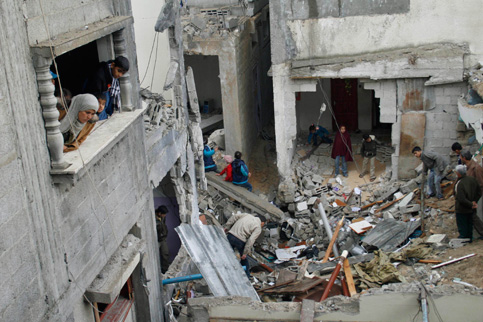With nowhere safe, Gazans hunker down inside their homes
 Saturday, January 3, 2009 at 10:37AM
Saturday, January 3, 2009 at 10:37AM http://www.mcclatch ydc.com/homepage /story/58905. html
Posted on Fri, Jan. 02, 2009
Ahmed Abu Hamda and Dion Nissenbaum | McClatchy Newspapers
GAZA CITY, Gaza Strip - Emad Falah can feel his world slowly closing in around him.
 Palestinians inspect the rubble of a destroyed police compound following an Israeli airstrike in Rafah, southern Gaza Strip, 29 December 2008. (Hatem Omar/MaanImages)
Palestinians inspect the rubble of a destroyed police compound following an Israeli airstrike in Rafah, southern Gaza Strip, 29 December 2008. (Hatem Omar/MaanImages)
It's been nearly a decade since the English-language interpreter for the Palestinian Authority left the confines of the Gaza Strip. It's been more than a year since he's seen friends who fled when Hamas seized military control of the isolated Mediterranean area from the Palestinian Authority.
Now his wife and four boys haven't left their Gaza City apartment since last Saturday, when Israeli missiles slammed into a building about 200 yards from their home on the first day of an ongoing attempt to destabilize Hamas.
Falah's father, mother, three sisters and their 11 children have fled their homes near the Israeli border, where fighting probably will be intense in the event of a ground offensive, and moved into his three-bedroom apartment.
"I am 36 years old and I have witnessed a lot of things, from (Israeli) incursions into Gaza and the beginning of the intifada," said Falah, referring to the second Palestinian uprising against Israeli occupation, which began in 2000. "But this is the first time for me to feel unsafe and insecure."
Under Israeli airstrikes that United Nations officials estimate have hit the Gaza Strip every 20 minutes on average, the 1.5 million Palestinians living here are finding that nowhere is safe.
"You don't know what target is going to be hit," Falah said. "It could be a house. It could be a mosque. It could be anything."
Gaza's only power plant has been closed for a week because Israel hasn't allowed in any industrial fuel. The sewage system is clogged to the bursting point. Hospitals have been overwhelmed treating up to 2,000 wounded Palestinians. The World Food Program warns that the Gaza Strip is facing a "food crisis" because there isn't enough flour, rice, sugar, dairy, meat or other crucial stocks coming in from Israel.
Compounding the problem, Palestinians are reluctant to deliver such supplies, fearing that they could be killed in an Israeli airstrike.
On the first day of the attack, Falah managed to stock up on canned meat, radio batteries, cooking fuel and a few other supplies. He and his wife moved mattresses into the dining room in the center of the apartment, which has become the bedroom for the whole family.
When the bombing started, Falah's children wanted to escape to their grandfather' s home in the countryside. Now their grandfather has moved in with them.
The apartment is packed with relatives, who keep away from the windows lest an attack shatter the glass. There's less and less electricity, sometimes as little as four hours a day. It's getting harder to find bread and more expensive to buy the dwindling goods on the store shelves. He's stored up enough cooking fuel to last a week or so, and so far the water pumps in his building are still working.
Falah ventures out when it seems quiet to try to find bread, vegetables and other food for his family. He never strays too far from home, however.
"I would rather die with my family in my home than die in the street alone," he said. "It is better to die at home with your family."
In a week of bombardment that the United Nations says has destroyed much of Gaza's infrastructure, Israel has hit neighborhood mosques, Gaza City's largest university, the Palestinian Authority guesthouse that once hosted then-President Bill Clinton, the Palestinian parliament building, the Palestinian beachside presidential compound and hundreds of other targets.
Israeli officials say that the attacks will halt when Hamas ends the volleys of crude rockets that have killed 10 Israelis in the last two years, including four in the past week.
To minimize civilian deaths, the Israeli military estimates that it's made more than 90,000 telephone calls over the last week to Palestinians in Gaza to warn them to leave places that missiles are about to hit.
In some cases, the strikes have landed within minutes. In others, according to United Nations officials, the attacks haven't come at all.
Some families say that they have nowhere to go, but about a quarter of the families in Falah's nine-story apartment building have tried to find somewhere safer.
Falah worked as an English interpreter for the Palestinian police until Hamas seized control of the Gaza Strip in June 2007. Since then, he's refused to work with the Hamas-led police force and has received a regular salary from the Palestinian Authority in the West Bank.
He has little sympathy for the Hamas rulers who took control of Gaza. However, he puts most of the blame for the current crisis on Israel.
"I think the Israelis want to knock down Hamas, so they have dragged Hamas into this war," he said.
Falah is among the many who see the attack on Gaza as an attempt by Israel to restore its tarnished image as the most feared military in the Middle East, a reputation hurt by its widely criticized 2006 war with Hezbollah fighters in Lebanon.
"I think the Israelis want a war to restore their honor," Falah said. "I think the war in Gaza is easier than the war in Lebanon."
(Hamda is a McClatchy special correspondent. Nissenbaum reported from Jerusalem.)
See also:"The radio reported that my friend was under the rubble"
Dr. Haider Eid writing from the occupied Gaza Strip, Live from Palestine, 31 December 2008
http://electronicintifada.net/v2/article10088.shtml
__._,_.___
 APJP |
APJP |  Post a Comment |
Post a Comment |